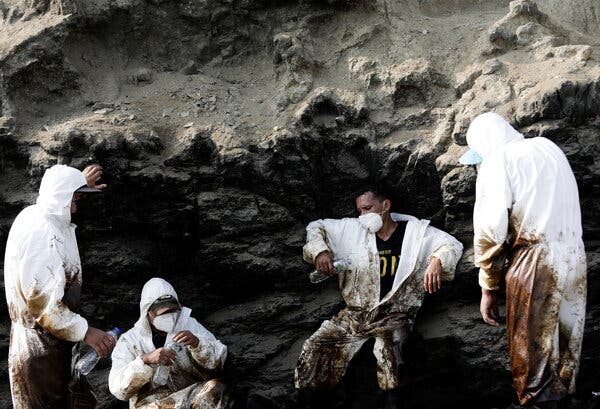The Peruvian government has asked for international support in responding to an oil spill off the coast of Lima that it called the city’s “worst ecological disaster” in recent history, as crude continued to wash onto beaches nearly a week after waves triggered by Tonga’s volcano eruption disrupted operations at a local refinery.
The environment ministry estimated some 6,000 barrels of crude had spilled into a biodiverse swath of Peru’s Pacific — well above the seven gallons that the refinery’s operator, the Spanish oil company Repsol, initially reported to authorities when the disaster occurred last Saturday.
On Thursday, the health ministry warned that 21 beaches were “a serious risk to health” and urged district authorities to restrict access to them. The government said the oil slick on the surface of the sea extended over an area of water equal to 320 football fields.
After an outcry over a cleanup operation widely seen as inadequate, the government said on Thursday that it had asked experts at the United Nations and the U.S. National Response Team to help ensure proper remediation and compensation from the company.
“We’re facing one of the biggest eco-cides on our coast,” President Pedro Castillo said from a polluted beach on Thursday. “The state is readying criminal, civil and administrative sanctions.”
The environment minister said Repsol could eventually have to pay fines worth some $36 million, and accused the company of failing to notify authorities in time and failing to describe the magnitude of the spill correctly.
Repsol did not immediately respond to a request seeking comment.
The spill has left hundreds of fishermen in poor coastal districts without work, and threatens two protected marine reserves where rocky islets provide havens for sea otters, Humboldt penguins and red-legged cormorants.
Peru’s Pacific waters are famously biodiverse, thanks to the cold, plankton-filled Humboldt current that runs along its coast, sustaining a chain of rich marine life, from anchovies and dolphins to marine birds whose excrement — guano — is collected and sold as organic fertilizer.
“We’re watching the destruction of the Peruvian marine ecosystem, and the livelihoods of those who depend on it, in slow motion, and it’s really terrifying,” said Juan Carlos Rivero, a marine biologist with the environmental nonprofit Oceana Peru. “Because neither the company nor the state has the capacity to respond.”
Repsol said the spill had happened Saturday afternoon when an oil tanker unloading crude at its refinery, Pampilla, was rocked by strong waves caused by the volcanic eruption near Tonga. The Italian shipping company that owns the tanker said an underwater pipeline at Pampilla’s terminal had suddenly ruptured during the process, and its crew had promptly turned off valves.
Unlike neighboring Chile and Ecuador, Peru had ruled out a tsunami from the Tonga eruption last Saturday, and failed to warn about potentially dangerous waves until after flooding had been reported in several coastal areas. In northern Peru, two women drowned when massive waves flooded a beach and swept them out to sea.
On Sunday, when Repsol first publicly acknowledged the oil spill, it described it as “limited” and said it had been “contained” thanks to its contingency plan. But by Monday it was clear the company had underestimated its size and impact. Local TV showed crude lapping onto shorelines at several beaches, with dead penguins and other sea birds covered in oil.
Mr. Rivero, who visited affected beaches this week, called the cleanup operation “tremendously improvised.” He said he saw workers hired by Repsol trying to use dustpans, buckets, wheelbarrows and plastic bags to remove crude from beaches soaked in it.
The government said Repsol had offered to hire local fishermen to help with the cleanup response. Volunteers have been trying to assist, but many lack proper protection and authorities said two have been hospitalized.
Repsol said on Thursday that it had more than 700 people working on the cleanup every day, including a team of divers to assess conditions underwater and crews that use suction pumps and absorbent material from boats.
“The oil is going to be in the sea for months,” said Mr. Rivero. “It’s going to affect our fauna. It’s going to affect our food, it’s going to affect our health, it’s going to affect our beaches.”


























